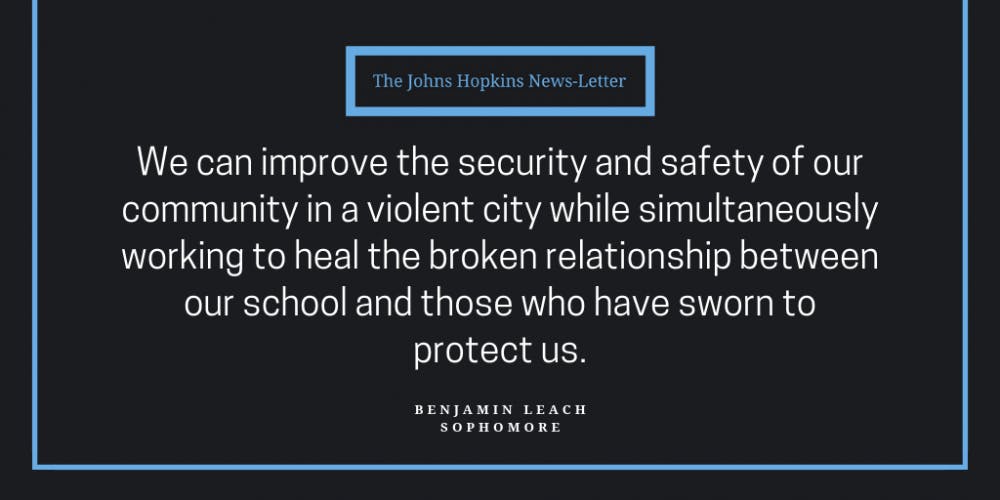Nearly a week has passed, and the student sit-in at Garland Hall continues. Occasionally the protestors will walk out with their megaphone as students head to class, chanting, among other things, “No Justice, No Peace! No Private Police!” This past Friday, I encountered the group as they came to Levering Kitchens, hoping to garner support in their condemnation of the University.
A lot of my fellow students and friends are against the Community Safety and Strengthening Act, the bill that will authorize Hopkins to create a private police force. I’ve seen numerous Facebook posts and events, fliers around campus and protests. I’ve seen pieces in The News-Letter expressing opposition to the bill.
I will never restrict my fellow citizens’ ability to protest against perceived injustice and to demand a redress of grievances, and I have a lot of respect for my peers for standing up for their beliefs. However, I do believe that their rationale is misguided, and that perhaps a police force is the most direct way of addressing the security problems that plague our campus.
Critics of the bill note the gross corruption of the Baltimore Police Department (BPD) and the likelihood that Hopkins police officers will act as the BPD does, racially profiling students and members of the community.
For the most part, I understand these concerns. The BPD clearly has a lot of issues, and they’ll be supplying the “JHPD” with many of their tactics and protocols.
However, we cannot display one side of the coin while ignoring the other. Baltimore is, and has been for some time, one of the most “dangerous cities” in the United States in terms of its rates of violent crime (which include assault, theft, homicide and rape). Forbes puts it at No. 7 in its top 10 most dangerous cities, while USA Today puts it at No. 3.
In 2017, nearly 22,000 violent crimes occurred in the city of Baltimore, following an upward trend since 2014. Hopkins has followed a similar trend, with the number of aggravated assaults around Hopkins campuses doubling between 2016 and 2017 and overtaking other Maryland universities for aggravated assaults in the same year. Homicide rates peaked in Baltimore in 2017 at 343 homicides. That’s nearly one every single day.
New Haven, home to Yale University, has a violent crime rate of 8.43 per 1,000 citizens. Yale University has a police force of 93 sworn officers. Similarly, Providence, RI, home to Brown University, has a violent crime rate of 5.33 per 1,000. As of 2017, they have a force of 53 sworn officers. State College, home to Penn State, has a rate of 1.74 per 1,000, and as of 2017 they have a force of 120 sworn officers.
On the other hand, Baltimore has a violent crime rate of 20.42 per 1,000 citizens, more than 10 times that of State College. Yet Hopkins does not have a private police force. Why do schools with much lower rates of violent crime have a police force to protect them, and our University does not?
I believe that the problem stems from the viewpoint the community has toward police officers as a whole. With the stories of corruption and police brutality dominating the news, we forget that there are just as many stories, if not more, of police officers being kind to the citizens they are sworn to protect.
We don’t hear about these stories because they simply aren’t newsworthy. It is taken as a given that officers are meant to treat citizens with respect and compassion. When that happens, why write a story about it?
However, when officers grossly misuse their power, it makes local or even national news. That’s not to say, of course, that corruption and racial profiling and all the other issues aren’t serious; they do need to be addressed and taken care of. It just seems that we’re ignoring the complexity of the issue, and are quick to villainize all police officers.
As it stands, Hopkins security officers don’t seem to actually do very much to make the community feel safe. Like police officers, they are guilty of racial profiling. They are less experienced and do not receive the necessary training that could deter them from doing so.
If we replaced them with sworn officers in direct sight of hundreds of students, with the power to arrest and intervene in crimes, we can more effectively reduce crime. Moreover, if they are in the vicinity and take the effort to make personal connections with students and the community, perhaps we can learn to set our biases aside and work together.
I won’t say that a private police force is the only option available, but why can’t we implement multiple policies at once?
We can tackle the root causes of crime – poverty, drugs, and the rest – and we can tackle the corruption and racism of the police force that already exists in our city. We can improve the security and safety of our community in a violent city while simultaneously working to heal the broken relationship between our school and those who have sworn to protect us.
I don’t know enough to argue on how specifically a private police force should be implemented, or how to hold them accountable for any wrongdoing they may take. What I do know is that I would feel safer knowing that there are men and women standing watch beneath my window, ensuring that my school and my community are protected.
Benjamin Leach is a sophomore studying Biomedical Engineering from Gilbert, Arizona.





